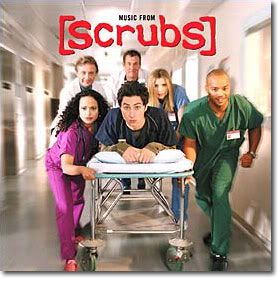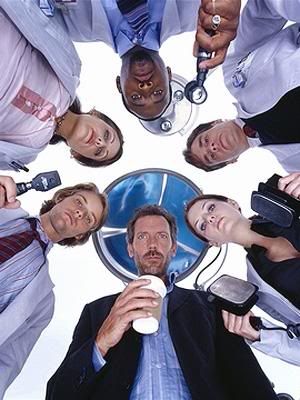It seems like there's a new wave of M.D. shows on TV. With the demise of Chicago Hope and E.R., and only Becker surviving the times, we now have two brand new, swanky doctor shows - SCRUBS and HOUSE.
 For the unacquainted, SCRUBS revolves around a few interns with overactive imaginations, hip lives, and a great zest for people. In short - a myth. But, hey, who among us MDs don't wish our lives were a little like that. I liked today's episode on Astro, actually, where a dying patient taught an intern that it was ok to rest.
For the unacquainted, SCRUBS revolves around a few interns with overactive imaginations, hip lives, and a great zest for people. In short - a myth. But, hey, who among us MDs don't wish our lives were a little like that. I liked today's episode on Astro, actually, where a dying patient taught an intern that it was ok to rest.
That he needed to give himself permission to go lie on the grass and relax for awhile. We MDs do become so obsessed and entrapped in our work sometimes as not to be able to see the bigger picture or to find ourselves apart from it.
 HOUSE, on the other hand, glorifies a team of diagnosticians whose expertise is solving the unsolvable cases. Those that, in our real life hospitals, normally go quietly unsolved. Labelled 'SEPTICEMIA' or 'M.I.'. These guys however, come up with high flung diagnoses like cerebral cysticercosis, or colchicine-poisoning. I understand that the whole point of this series is that - the diagnostic genius of Dr. House and his dream team. What is unrealistic is how these guys run ALL the lab tests themselves! From gene sequencing to viral antibody titres! That's really taking it too far.
HOUSE, on the other hand, glorifies a team of diagnosticians whose expertise is solving the unsolvable cases. Those that, in our real life hospitals, normally go quietly unsolved. Labelled 'SEPTICEMIA' or 'M.I.'. These guys however, come up with high flung diagnoses like cerebral cysticercosis, or colchicine-poisoning. I understand that the whole point of this series is that - the diagnostic genius of Dr. House and his dream team. What is unrealistic is how these guys run ALL the lab tests themselves! From gene sequencing to viral antibody titres! That's really taking it too far.
What I DO like about it, is the FED-UPness of House (which is true of all of us after seeing one patient too many) and the METICULOUSNESS of his problem-solving. I've seen more than one technique that we actually employ in real life, being used. One is the acronym for pathologies - he uses MIDNIGHT (for metabolic, infective, degenerative, neoplastic, etc.), and the other is the Venn diagram for looking for the disease that accounts for ALL presenting symptoms. Also the mention of Occam's razor was very gratifying to me - the simplest explanation is most likely the correct one.
As doctors we may pooh-pooh the idealism, unreal-ness, or far-fetchedness of some of the stories, but let's not deny that in some way it validates our lives as human beings. That's what I like about these shows - they portray us frail, vulnerable, and confused like everyone else. And even if it doesn't change public perception, I hope it helps us to accept ourselves better.
 For the unacquainted, SCRUBS revolves around a few interns with overactive imaginations, hip lives, and a great zest for people. In short - a myth. But, hey, who among us MDs don't wish our lives were a little like that. I liked today's episode on Astro, actually, where a dying patient taught an intern that it was ok to rest.
For the unacquainted, SCRUBS revolves around a few interns with overactive imaginations, hip lives, and a great zest for people. In short - a myth. But, hey, who among us MDs don't wish our lives were a little like that. I liked today's episode on Astro, actually, where a dying patient taught an intern that it was ok to rest.  HOUSE, on the other hand, glorifies a team of diagnosticians whose expertise is solving the unsolvable cases. Those that, in our real life hospitals, normally go quietly unsolved. Labelled 'SEPTICEMIA' or 'M.I.'. These guys however, come up with high flung diagnoses like cerebral cysticercosis, or colchicine-poisoning. I understand that the whole point of this series is that - the diagnostic genius of Dr. House and his dream team. What is unrealistic is how these guys run ALL the lab tests themselves! From gene sequencing to viral antibody titres! That's really taking it too far.
HOUSE, on the other hand, glorifies a team of diagnosticians whose expertise is solving the unsolvable cases. Those that, in our real life hospitals, normally go quietly unsolved. Labelled 'SEPTICEMIA' or 'M.I.'. These guys however, come up with high flung diagnoses like cerebral cysticercosis, or colchicine-poisoning. I understand that the whole point of this series is that - the diagnostic genius of Dr. House and his dream team. What is unrealistic is how these guys run ALL the lab tests themselves! From gene sequencing to viral antibody titres! That's really taking it too far.  Most adults, regardless of party identification or religious affiliation, believe embryonic stem cell research should be allowed. Support has remained high over the past year as nearly three-quarters (74 percent) of U.S. adults believe stem cell research should be allowed today (73 percent in 2004).
Most adults, regardless of party identification or religious affiliation, believe embryonic stem cell research should be allowed. Support has remained high over the past year as nearly three-quarters (74 percent) of U.S. adults believe stem cell research should be allowed today (73 percent in 2004). Peter Sheppard teaches in his book, Life Matters the 'Learning Paradigm', which consists of:
Peter Sheppard teaches in his book, Life Matters the 'Learning Paradigm', which consists of: